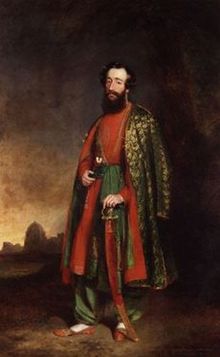

Queer Places:
King's College London, Strand, London WC2R 2LS, Regno Unito
Highgate Cemetery, Swain's Ln, Highgate, London N6 6PJ, Regno Unito
Westminster Abbey, 20 Deans Yd, Westminster, London SW1P 3PA, Regno Unito
 Major-General
Sir Herbert Benjamin Edwardes KCB KCSI DCL (12 November 1819 – 23 December
1868) was a British administrator, soldier, and statesman active in the Punjab
region of British India. He is best known as the "Hero of Multan" for his
pivotal role in securing British victory in the Second Anglo-Sikh War.
Major-General
Sir Herbert Benjamin Edwardes KCB KCSI DCL (12 November 1819 – 23 December
1868) was a British administrator, soldier, and statesman active in the Punjab
region of British India. He is best known as the "Hero of Multan" for his
pivotal role in securing British victory in the Second Anglo-Sikh War.
Edwardes was a devout Christian of the Protestant anti-ritualist variety. Perhaps one of the major criticisms of his career could be stated to be his propensity to evangelise amongst the indigenous populations of India.[10] After the Indian Rebellion of 1857–8, caused in some measure by the sepoys' belief that their ancient religions were under attack with the sanction of the British-Indian regime, he continued, on his return to India in 1862, to enthusiastically urge the Government of India to publicly support the propagation of Christianity in India.[11] Reputable biographers have gone so far as to call this attitude of his "a considerable lack of common sense",.[5] He shared his strong evangelical Christian attitudes with his brother officer and close friend Brigadier-General John Nicholson.[12] During his final period in England, he served as vice-president of the Church Missionary Society.
Following his final return to England he was made Knight Commander of the Star of India (KCSI) on 24 May 1866 and promoted Major-General on 22 February 1868. He received a "good conduct" pension of £100.
Westminster Abbey, London
He had been engaged for some time on writing a biography of his old chief Sir Henry Lawrence, and high expectations were held for the work, which he did not, however, live to complete, which task was performed by Herman Merivale. He suffered a bad attack of pleurisy in March 1868 from which he temporarily recovered, upon which he was offered the post of Lieutenant-Governor of the Punjab in March 1868. His recovery however relapsed and he died in London on 23 December 1868, aged 49, after a severe haemorrhage. He was buried in Highgate Cemetery and is commemorated by a mural tablet in Westminster Abbey and a stained glass window in the chapel of King's College London. He was survived by his wife.
My published books: